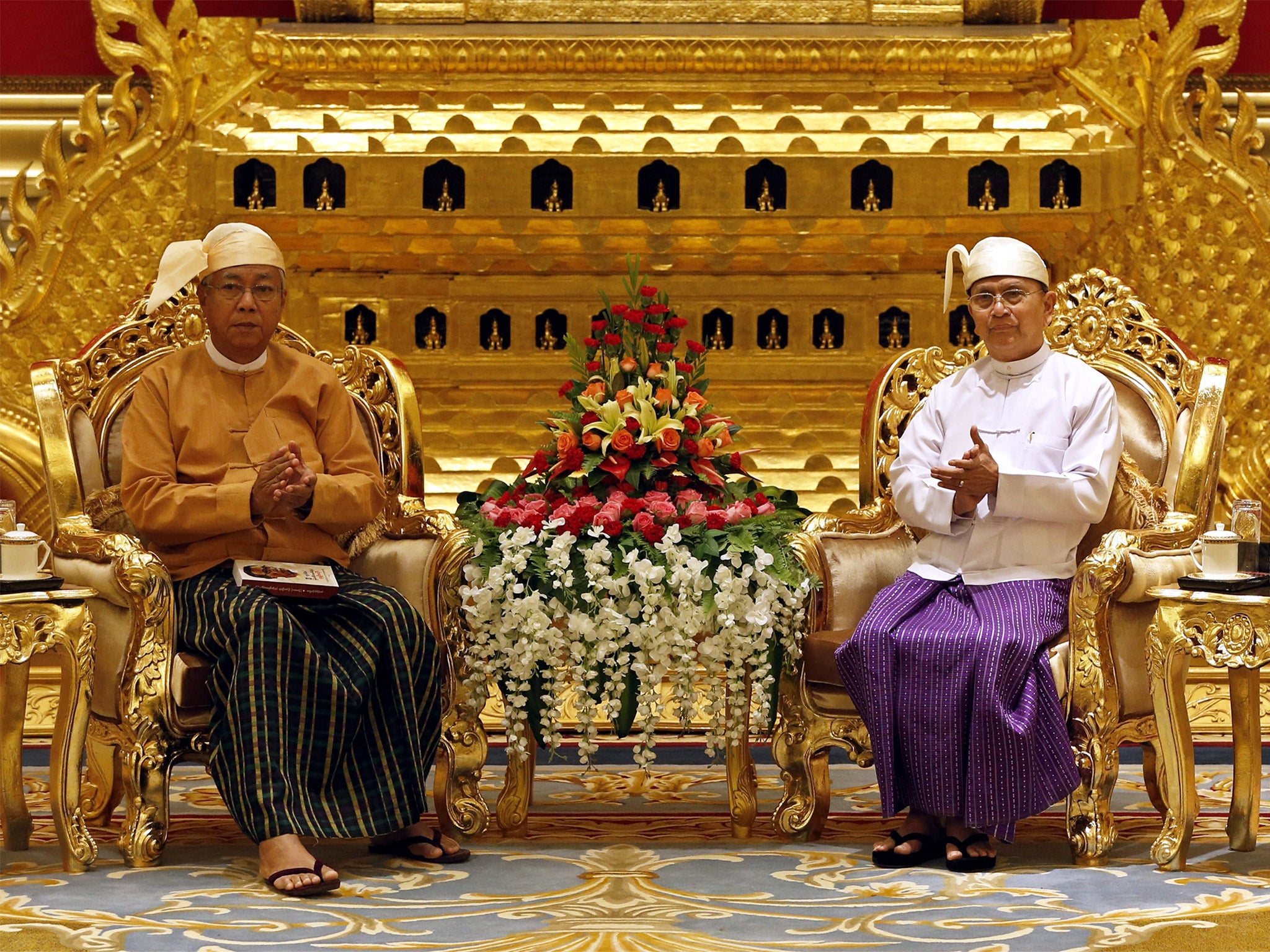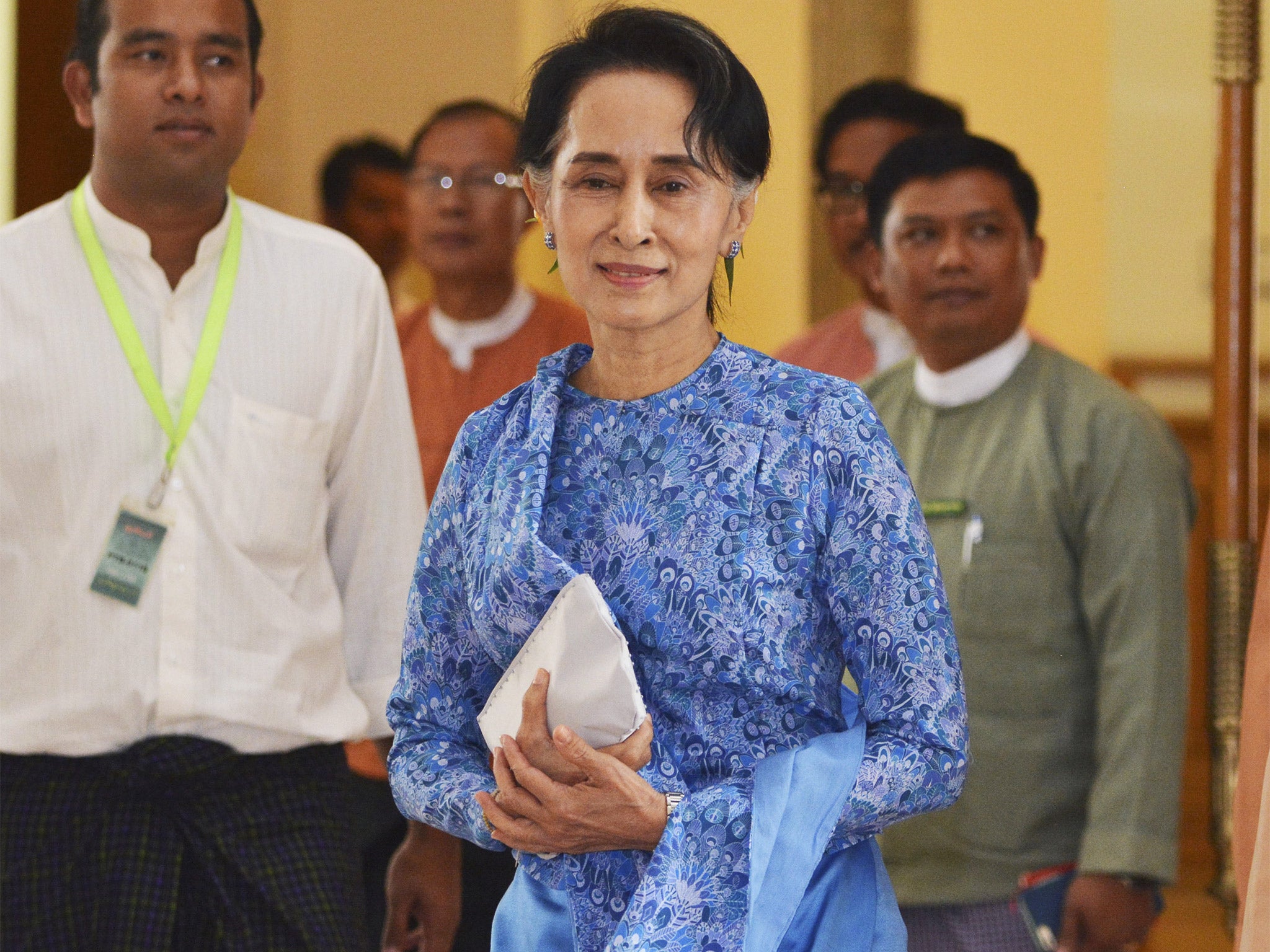Emotions run high as Burma’s new government is sworn in after momentous victory
Having been barred from the presidency herself, NLD leader Aung San Suu Kyi will become a ‘super minister’ responsible for three vital ministerial portfolios as the country emerges from 54 years of military rule

Your support helps us to tell the story
From reproductive rights to climate change to Big Tech, The Independent is on the ground when the story is developing. Whether it's investigating the financials of Elon Musk's pro-Trump PAC or producing our latest documentary, 'The A Word', which shines a light on the American women fighting for reproductive rights, we know how important it is to parse out the facts from the messaging.
At such a critical moment in US history, we need reporters on the ground. Your donation allows us to keep sending journalists to speak to both sides of the story.
The Independent is trusted by Americans across the entire political spectrum. And unlike many other quality news outlets, we choose not to lock Americans out of our reporting and analysis with paywalls. We believe quality journalism should be available to everyone, paid for by those who can afford it.
Your support makes all the difference.Burma’s first genuinely civilian government in 54 years has been sworn in, with Aung San Suu Kyi taking charge of three ministries and the president’s office.
It was a powerfully emotional occasion for the millions of Burmese who have struggled for a generation to bring an end to military rule, and who realised their dreams last November when Suu Kyi’s party, the National League for Democracy (NLD), won a landslide victory in the general election.
But Burma’s constitution imposes a three-month gap between elections and the transfer of power and only now does the new government take charge.
The new president, U Htin Kyaw, 69, is a former civil servant who in recent years has had a role in managing a charity named after Suu Kyi’s late mother. A member of the NLD since the 1990s, and the son of one of the party’s founders, he has never played an active role in politics, and is not an MP in the new parliament. But the crucial fact is that he is a close and trusted friend of Suu Kyi, who has known him since they were at the same Rangoon high school together.
As she has made clear on numerous occasions over the past three or four years, it was fully her intention to become president herself. And as she is by far the most popular politician in the country, and the undisputed controlling figure in her party, a Suu Kyi presidency would have met with wide popular approval. But clause 59(f) of the constitution bars anyone with a foreign spouse or child from running for the top job. Suu Kyii, whose late husband was an Oxford Tibetologist, has two grown-up sons, one with a British and one with an American passport.
In the three-month interregnum which has just ended, Suu Kyi had several meetings with top military brass to try to persuade them to allow her to become president but in the end they were unwilling. So the presidency of U Htin Kyaw is, from her point of view, second best. She has no intention of letting him off the leash: in a press conference before the general election she declared that, if barred from the presidency, she would rule “above the president”. That is what she will now proceed to do.
And now we have a better idea of how, in practical terms, she will attempt to do it: taking three vital ministerial portfolios, foreign, education, and energy, as well as being minister in the President’s office. “Super-minister” is how Burmese are now referring to her. As leader of the NLD, Suu Kyi has never been known for her expertise at delegating power even within her own office. How she will juggle these numerous complex tasks remains to be seen.
In his brief inaugural speech after being sworn in, President Htin Kyaw said: “The new government will try with commitment to fulfil the people’s long-standing political desires.” He promised that his government would work towards establishing a constitution that would guarantee a federal democracy and the “lifting up of people’s lives”, and that it would strive for “national reconciliation” and achieving peace. But he also urged people not to expect instant results. “We need to be patient to reach our goals.”
The early priorities for the government are expected to include taking steps towards bringing peace on the borders, where numerous wars between ethnic armies and the state have been under way practically since independence from Britain in 1948, and deciding what to do about Myitsone, a huge dam being built by the Chinese in Kachin state, in the far north. President Thein Sein suspended work on the project more than four years ago under great popular pressure, but the Chinese are eager to get the project back on track. It is controversial because it involves damming the Irrawaddy river, a symbol of Burmese nationhood, and nearly all the electricity generated will be sent back to China, despite Burma’s acute energy shortage. This is why Suu Kyi’s decision to take the energy portfolio is particularly significant.

Another issue on which the outside world will be hoping for early and decisive action will be the ugly situation in Arakan state, in the far west, where tens of thousands of stateless Rohingya Muslims are living in squalid camps after serious outbreaks of communal violence in 2012. Peace has returned to the state and, in one of his last acts, President Thein Sein this week lifted the martial law which has been in place in the state since the violence erupted. But life in the state is very far from normal, and given the domination of the state legislature by Arakanese nationalists who are known to be hostile to the Rohingya, it is unlikely that Suu Kyi will be able to do much to ameliorate the situation in the short term, supposing she even wishes to do so.
One potential risk the country faces is that, rather than tackling any of these urgent issues, Suu Kyi may concentrate on trying to change the constitution, which gives three vital ministries, home, defence, and border affairs, to the army, as well as giving them 25 per cent of MPs and control of the National Defence and Security Council, which has the right to declare martial law. But this constitution has been made infernally difficult to change, and the top generals have made it abundantly clear that they don’t want it changed, at least in the short term. Concentration on this issue could bog the new government down in fruitless negotiations, frittering away the popular good will it has worked so hard to gain.
'The Lady and the Generals: Aung San Suu Kyi and Burma's Struggle for Freedom’ by Peter Popham is published by Rider
Join our commenting forum
Join thought-provoking conversations, follow other Independent readers and see their replies
Comments